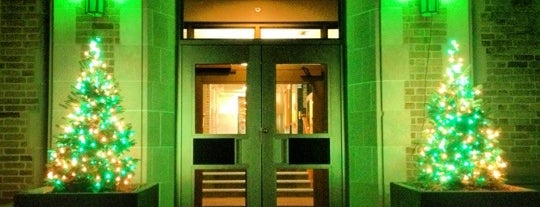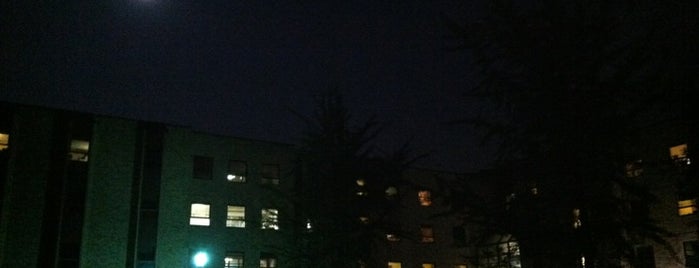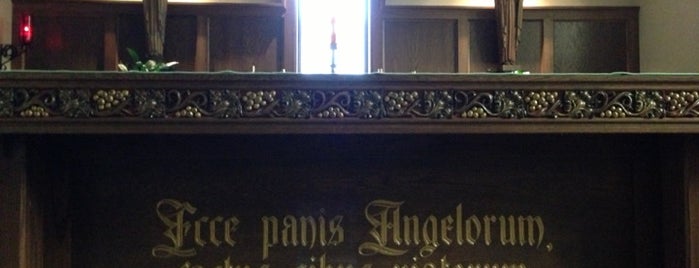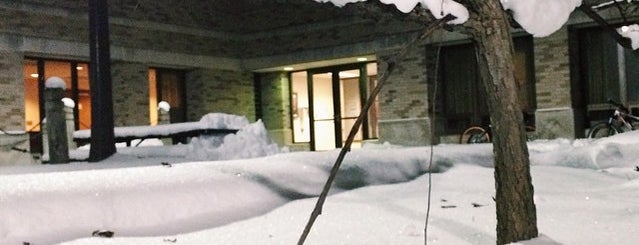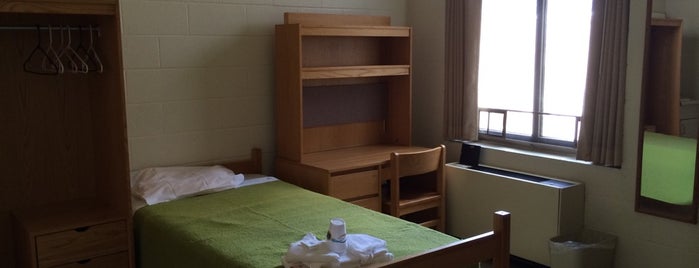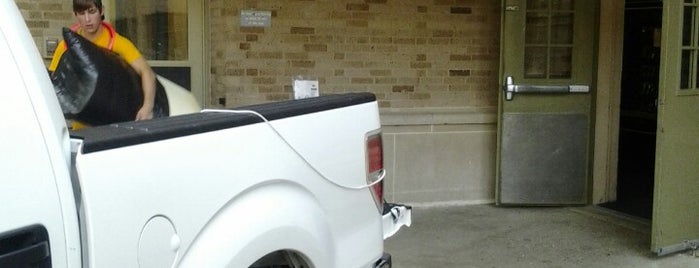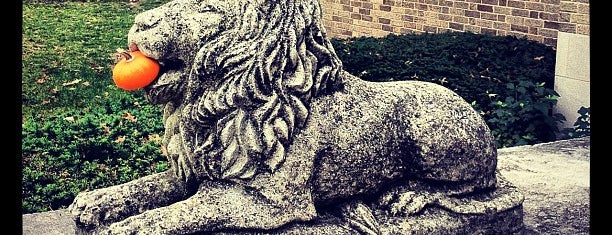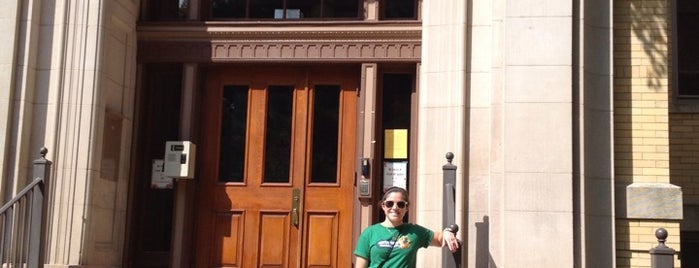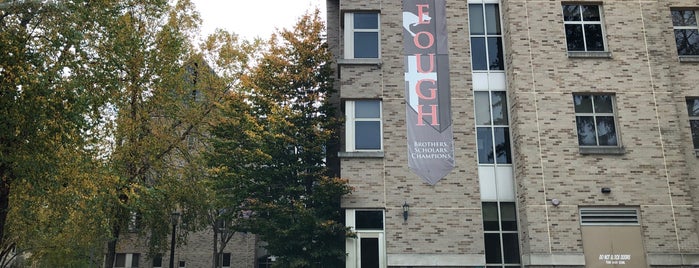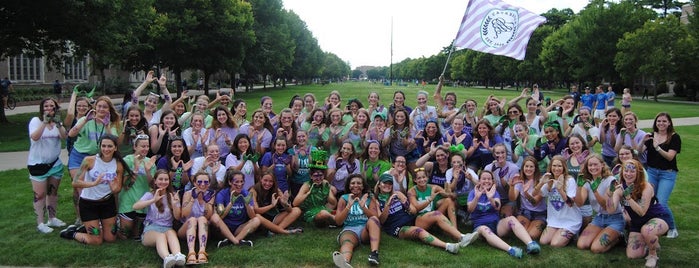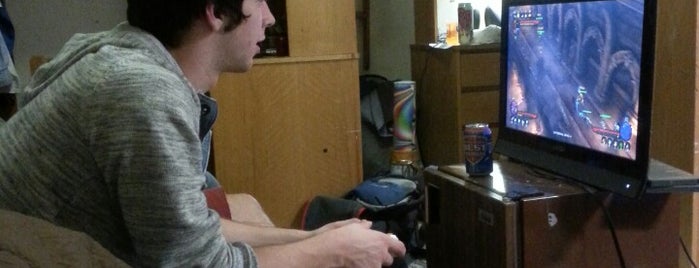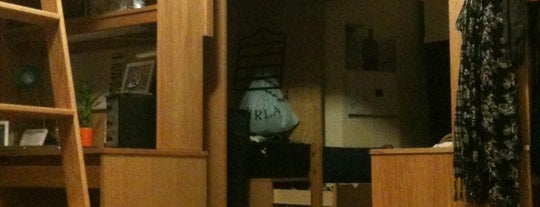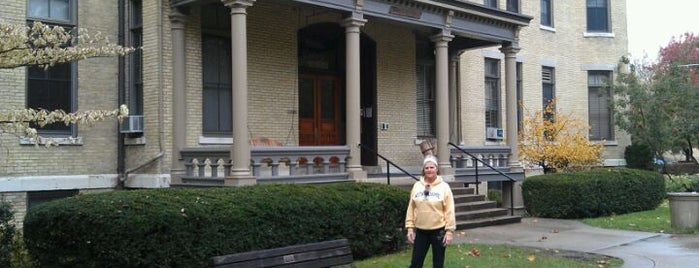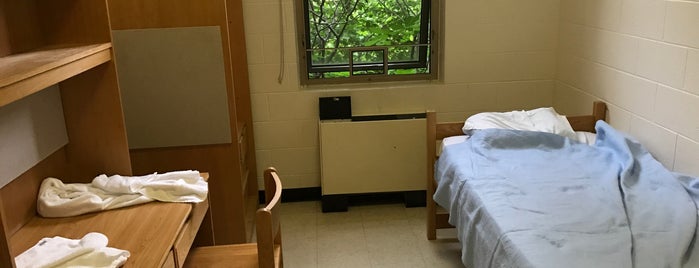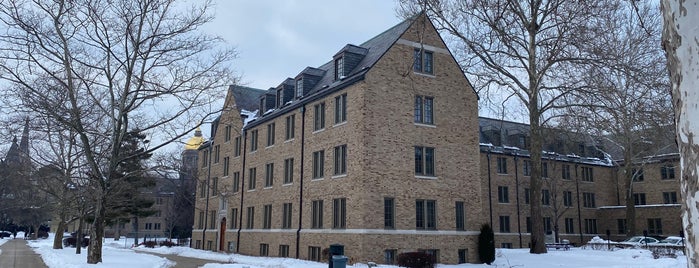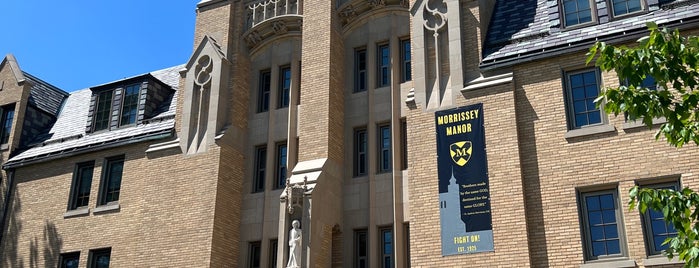![]() Constructed in 1931, this hall was named to honor the University’s loyal graduates and the circumference features an impressive array of gargoyles and stone carvings. Alumni Hall is home to 269 men. Leia mais.
Constructed in 1931, this hall was named to honor the University’s loyal graduates and the circumference features an impressive array of gargoyles and stone carvings. Alumni Hall is home to 269 men. Leia mais.
![]() Built in 1957, Stanford Hall was funded by Notre Dame alumnus and Trustee Grattan T. Stanford. Stanford Hall is connected to and shares a chapel and entrance room with Keenan Hall. Leia mais.
Built in 1957, Stanford Hall was funded by Notre Dame alumnus and Trustee Grattan T. Stanford. Stanford Hall is connected to and shares a chapel and entrance room with Keenan Hall. Leia mais.
![]() Built in 1952, this men’s hall construction was funded by Sally Fisher, who dedicated the hall to her husband Fred, a former member of the University’s Board of Trustees. Leia mais.
Built in 1952, this men’s hall construction was funded by Sally Fisher, who dedicated the hall to her husband Fred, a former member of the University’s Board of Trustees. Leia mais.
![]() The first residence hall built both specifically for women and with air conditioning, Pasquerilla West Hall was constructed in 1981 and funded by Frank and Sylvia Pasquerilla. It is home to 250 women. Leia mais.
The first residence hall built both specifically for women and with air conditioning, Pasquerilla West Hall was constructed in 1981 and funded by Frank and Sylvia Pasquerilla. It is home to 250 women. Leia mais.
![]() Constructed in 1937 and named after Rev. John Augustine Zahm, C.S.C., an 1871 graduate of the University, Zahm Hall is home to nearly 230 men. Its residents lovingly refer to it as “Zahm House.” Leia mais.
Constructed in 1937 and named after Rev. John Augustine Zahm, C.S.C., an 1871 graduate of the University, Zahm Hall is home to nearly 230 men. Its residents lovingly refer to it as “Zahm House.” Leia mais.
![]() Built in 1988, the construction was funded by Henry J. Knott Sr., who named the hall after his wife, Marion Burk Knott. Originally a women’s residence hall, it was converted to a men’s hall in 1997. Leia mais.
Built in 1988, the construction was funded by Henry J. Knott Sr., who named the hall after his wife, Marion Burk Knott. Originally a women’s residence hall, it was converted to a men’s hall in 1997. Leia mais.
![]() Construction of the women’s residence hall was completed in 1997 and funded by Notre Dame alumnus Terrence McGlinn and his wife, Barbara. Located on West Quad, McGlinn is home to more than 260 women. Leia mais.
Construction of the women’s residence hall was completed in 1997 and funded by Notre Dame alumnus Terrence McGlinn and his wife, Barbara. Located on West Quad, McGlinn is home to more than 260 women. Leia mais.
![]() Built in 1957, Keenan Hall is named for Notre Dame alumnus James Keenan and dedicated in memory of his son, James Keenan, Jr. Connected to Stanford Hall, nearly 300 men call Keenan Hall home. Leia mais.
Built in 1957, Keenan Hall is named for Notre Dame alumnus James Keenan and dedicated in memory of his son, James Keenan, Jr. Connected to Stanford Hall, nearly 300 men call Keenan Hall home. Leia mais.
![]() The dorm was constructed as a men’s residence hall in 1955 and funded by philanthropic brothers Thomas and John Pangborn. It was converted into a women’s residence hall in 1992 and renovated in 2002. Leia mais.
The dorm was constructed as a men’s residence hall in 1955 and funded by philanthropic brothers Thomas and John Pangborn. It was converted into a women’s residence hall in 1992 and renovated in 2002. Leia mais.
![]() Funded by alumni Robert Siegfried (’37) and Ray Siegfried (’65), Siegfried Hall was constructed as a women’s residence hall in 1988, but converted into a men’s hall in 1997. It is home to 250 men. Leia mais.
Funded by alumni Robert Siegfried (’37) and Ray Siegfried (’65), Siegfried Hall was constructed as a women’s residence hall in 1988, but converted into a men’s hall in 1997. It is home to 250 men. Leia mais.
![]() Built in 1882 as a boarding school for grade school children, this men’s hall is the oldest residence hall at Notre Dame and is the only campus building in the National Register of Historic Places. Leia mais.
Built in 1882 as a boarding school for grade school children, this men’s hall is the oldest residence hall at Notre Dame and is the only campus building in the National Register of Historic Places. Leia mais.
![]() Built in 1909 as a men’s residence hall and named for Rev. Thomas Walsh, the University’s sixth president, Walsh Hall was one of the first halls to be converted into women’s residences in 1972. Leia mais.
Built in 1909 as a men’s residence hall and named for Rev. Thomas Walsh, the University’s sixth president, Walsh Hall was one of the first halls to be converted into women’s residences in 1972. Leia mais.
![]() Built in 1906 and purchased by the University in 1966, this men’s dorm is known for its distance from the rest of campus and picturesque views of St. Mary’s Lake, the Dome, and the Basilica. Leia mais.
Built in 1906 and purchased by the University in 1966, this men’s dorm is known for its distance from the rest of campus and picturesque views of St. Mary’s Lake, the Dome, and the Basilica. Leia mais.
![]() Built in 1996, O’Neill Hall was funded by the O’Neill family and dedicated in honor of Joseph O’Neill, Jr., a 1937 alumnus. Located on West Quad, it is home to 260 men. Leia mais.
Built in 1996, O’Neill Hall was funded by the O’Neill family and dedicated in honor of Joseph O’Neill, Jr., a 1937 alumnus. Located on West Quad, it is home to 260 men. Leia mais.
![]() Now home to 240 women, Farley was completed in 1947 as a male residence hall with Rev. Theodore Hesburgh C.S.C., later University president, was the hall’s first rector. Leia mais.
Now home to 240 women, Farley was completed in 1947 as a male residence hall with Rev. Theodore Hesburgh C.S.C., later University president, was the hall’s first rector. Leia mais.
![]() Completed in 1996, Keough Hall houses 260 men. The hall, located on West Quad, is named for Marilyn M. Keough, who funded the construction of the hall with her husband, Donald. Leia mais.
Completed in 1996, Keough Hall houses 260 men. The hall, located on West Quad, is named for Marilyn M. Keough, who funded the construction of the hall with her husband, Donald. Leia mais.
![]() Now home to 248 women after opening in 2009, Ryan Hall is the newest residence halls. New design elements include the addition of classrooms and an increase in proportion of single rooms. Leia mais.
Now home to 248 women after opening in 2009, Ryan Hall is the newest residence halls. New design elements include the addition of classrooms and an increase in proportion of single rooms. Leia mais.
![]() After becoming a women’s dorm in 1975, it is now the largest women’s residence hall on campus and is home to 300 women. Construction was funded by Julia Lewis and dedicated to her husband, Frank. Leia mais.
After becoming a women’s dorm in 1975, it is now the largest women’s residence hall on campus and is home to 300 women. Construction was funded by Julia Lewis and dedicated to her husband, Frank. Leia mais.
![]() The smallest women’s dorm on campus was constructed in 1897 and was one of the first women’s residences in 1972. It is named for Rev. Stephen Badin, the first Catholic priest ordained in the U.S. Leia mais.
The smallest women’s dorm on campus was constructed in 1897 and was one of the first women’s residences in 1972. It is named for Rev. Stephen Badin, the first Catholic priest ordained in the U.S. Leia mais.
![]() Constructed in 1936, Cavanaugh Hall became a women’s residence hall in 1994. It is named after Rev. John W. Cavanaugh who served as president of the University from the 1905 to 1914. Leia mais.
Constructed in 1936, Cavanaugh Hall became a women’s residence hall in 1994. It is named after Rev. John W. Cavanaugh who served as president of the University from the 1905 to 1914. Leia mais.
![]() With 81,000 square feet of space for some 340 male students, Dillon is the largest dorm on campus. The hall was built in honor of Rev. Patrick Dillon, Notre Dame’s second president. Leia mais.
With 81,000 square feet of space for some 340 male students, Dillon is the largest dorm on campus. The hall was built in honor of Rev. Patrick Dillon, Notre Dame’s second president. Leia mais.
![]() Before being converted to a women’s dorm in 1974, Lyons was built in 1925 and was named after Joseph Lyons, an alumnus and popular English professor in the 1860s. The hall houses around 200 women. Leia mais.
Before being converted to a women’s dorm in 1974, Lyons was built in 1925 and was named after Joseph Lyons, an alumnus and popular English professor in the 1860s. The hall houses around 200 women. Leia mais.
![]() Originally constructed in 1924, Howard Hall began housing women in 1987. It was the first building on campus to incorporate gothic architecture and features two arches and decorative stone carvings. Leia mais.
Originally constructed in 1924, Howard Hall began housing women in 1987. It was the first building on campus to incorporate gothic architecture and features two arches and decorative stone carvings. Leia mais.
![]() One of three buildings funded by Frank and Sylvia Pasquerilla, this women’s residence hall mirrors Pasquerilla West Hall, both of which were constructed in 1981. Pasquerilla East houses 250 women. Leia mais.
One of three buildings funded by Frank and Sylvia Pasquerilla, this women’s residence hall mirrors Pasquerilla West Hall, both of which were constructed in 1981. Pasquerilla East houses 250 women. Leia mais.
![]() Built in 1888, the hall is named after the University’s founder, Red. Edward Sorin, and is known as “Sorin College” by its residents. It is now home to around 150 men. Leia mais.
Built in 1888, the hall is named after the University’s founder, Red. Edward Sorin, and is known as “Sorin College” by its residents. It is now home to around 150 men. Leia mais.
![]() Built in 1997 and named after its benefactors, Notre Dame alumnus and former Trustee Robert Welsh and his wife Kathleen, Welsh Family Hall is located on West Quad and is home to undergraduate women. Leia mais.
Built in 1997 and named after its benefactors, Notre Dame alumnus and former Trustee Robert Welsh and his wife Kathleen, Welsh Family Hall is located on West Quad and is home to undergraduate women. Leia mais.
![]() Today the hall houses over 200 women, but it was originally constructed as a men’s residence hall in 1939. At one point, the athletic department, including Leahy, was located in the basement. Leia mais.
Today the hall houses over 200 women, but it was originally constructed as a men’s residence hall in 1939. At one point, the athletic department, including Leahy, was located in the basement. Leia mais.
![]() Built in 1843 by Rev. Edward Sorin, it is the oldest building on campus, and now serves as the undergraduate seminary for the Indiana province of the Congregation of Holy Cross priests. Leia mais.
Built in 1843 by Rev. Edward Sorin, it is the oldest building on campus, and now serves as the undergraduate seminary for the Indiana province of the Congregation of Holy Cross priests. Leia mais.
![]() Frequently referred to as “Morrissey Manor” due to its architecture, this home to 230 men was built in 1925 and named after the University’s seventh president, Rev. Andrew Morrissey, C.S.C. Leia mais.
Frequently referred to as “Morrissey Manor” due to its architecture, this home to 230 men was built in 1925 and named after the University’s seventh president, Rev. Andrew Morrissey, C.S.C. Leia mais.
![]() Initially opened to residents in fall 2008, Duncan Hall was the first new residence hall built in more than a decade. The hall, home to around 230 men, is located next to the nine-hole golf course. Leia mais.
Initially opened to residents in fall 2008, Duncan Hall was the first new residence hall built in more than a decade. The hall, home to around 230 men, is located next to the nine-hole golf course. Leia mais.

